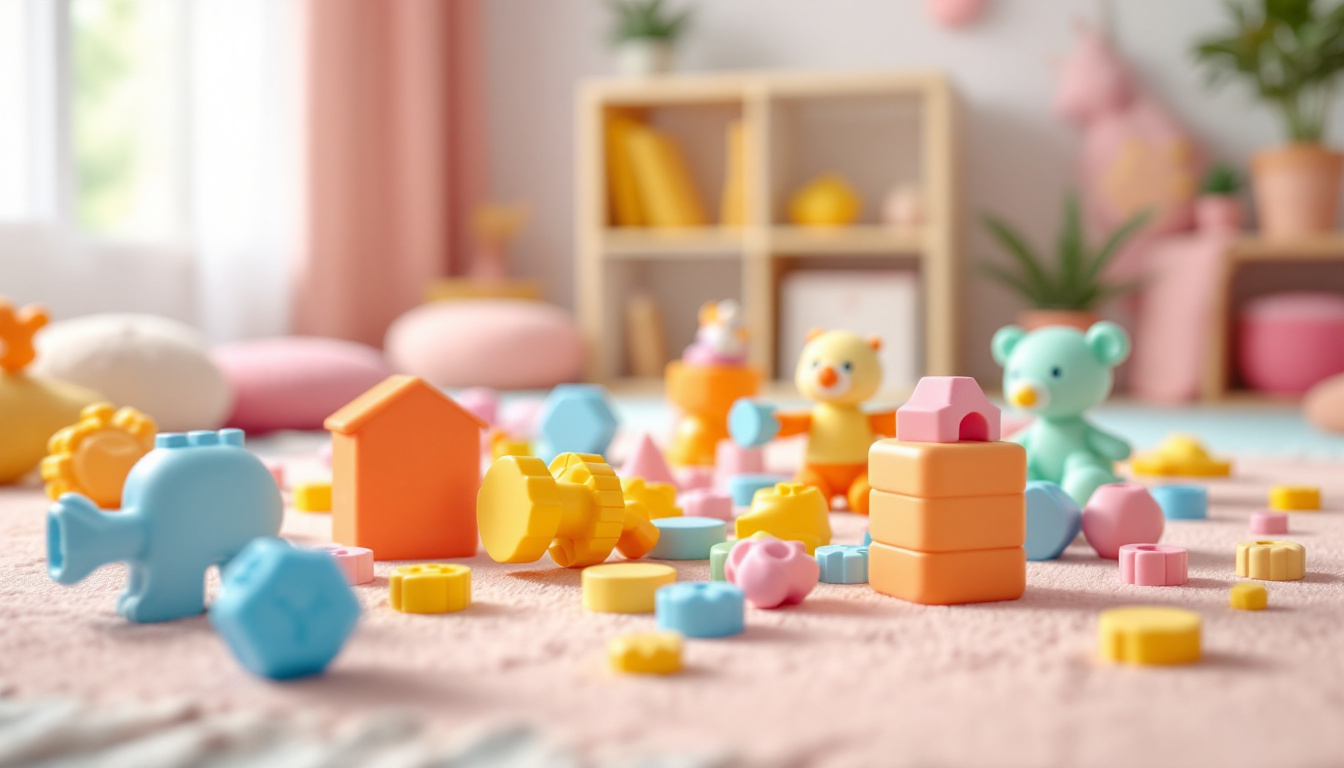
Benefits of Sensory Toys
Exploring the Power of Sensory Toys in Child Development
Understanding Sensory Toys
Sensory toys are specifically designed objects that stimulate one or more of a child's senses, making them valuable tools for cognitive and developmental growth. These toys are particularly beneficial for children on the autism spectrum or those with sensory processing issues, offering engaging ways to explore the world. In this article, we delve into the various categories of sensory toys, their benefits, and practical ways to integrate them into everyday life for enhanced developmental support.
The Essence of Sensory Toys

Definition and purpose of sensory toys
Sensory toys are specially designed tools that stimulate one or more of a child's senses. They encourage exploration and play during vital developmental stages, reinforcing the growth of sensory pathways that are crucial for cognitive and learning development. Common sensory toys include textured blocks, musical instruments, and interactive items that engage sight, sound, touch, taste, and smell.
These toys play an essential role in enhancing fine and gross motor skills, aiding language and social skills development. They facilitate engagement with family and peers, promoting turn-taking, sharing, and collaborative problem-solving. Moreover, sensory toys often provide a calming influence, helping to regulate emotional levels and create a safe space for exploration.
How sensory toys aid multiple sensory experiences
Sensory toys cater to diverse sensory preferences, thus providing rich experiences for children of varying needs. For example, liquid timers mesmerize kids while improving focus, while weighted blankets offer a soothing heaviness that can ease anxiety.
The interactive nature of sensory toys encourages children to experiment, thereby fostering creative thinking and problem-solving capabilities. Moreover, by engaging multiple senses, these toys support sensory integration, facilitating an understanding of their environment.
The following table summarizes the key benefits of sensory toys:
| Benefit | Description | Example Toys |
|---|---|---|
| Cognitive Development | Enhances memory and problem-solving skills | Building blocks, puzzles |
| Motor Skills Enhancement | Develops fine and gross motor skills | Manipulative toys, play dough |
| Social Skills Improvement | Encourages interaction and communication | Board games, role-play sets |
| Emotional Regulation | Calms anxiety and promotes focus | Weighted blankets, fidget spinners |
What are sensory toys for babies?
Sensory toys for babies are specially designed objects that stimulate one or more of a child's senses, promoting exploration and learning during critical stages of development. These toys help develop not only the traditional five senses—sight, sound, touch, taste, and smell—but also additional senses such as proprioceptive (body awareness), vestibular (balance), and interoceptive (internal bodily awareness). Engaging with sensory toys supports the formation of sensory pathways in babies, which is vital for cognitive and learning development. Interactive toys, in particular, enhance skills related to cause and effect, making play both fun and educational. It's important to choose sensory toys that are safe, sturdy, and appropriate for the child's age, adhering to guidelines from organizations like the American Academy of Pediatrics.
The Role of Sensory Toys in Development
What benefits do sensory toys offer for children, especially those with autism or sensory processing issues?
Sensory toys are remarkably beneficial for children, particularly those with autism or sensory processing challenges. These toys enhance play experiences and support sensory integration. They come in various forms, including tactile stimulation toys, weighted blankets, and sensory chew toys, designed to meet specific sensory preferences.
Engaging with sensory toys promotes cognitive growth, as children explore and experiment, nurturing their problem-solving and critical thinking skills. For instance, a liquid timer helps children visualize cause-and-effect relationships, deepening their understanding of how their actions influence their environment.
Additionally, these toys significantly boost social skills through interactive play, encouraging turn-taking and sharing among peers. They also contribute to fine motor development by engaging children in activities that require squeezing and manipulating small objects.
In terms of emotional health, sensory toys are tools for self-regulation. They provide children a safe outlet to manage anxiety and improve focus, creating a calming atmosphere. Overall, sensory play is essential during early childhood, fostering creativity, emotional intelligence, and a deeper connection with their environment.
Cognitive, social, and emotional benefits
The cognitive, social, and emotional benefits of sensory toys are profound.
- Cognitive development: Through exploration and play, children enhance their memory, observational skills, and problem-solving abilities, crucial for academic success.
- Social skills: Sensory play encourages interaction with peers, improving communication abilities and helping children understand social cues.
- Emotional development: Engaging in sensory play assists in developing emotional regulation strategies, fostering resilience, and promoting relaxation when children feel overwhelmed.
By integrating sensory experiences, these toys facilitate overall growth, helping children navigate their world with confidence and creativity.
Understanding Children's Sensory Needs

Importance of sensory needs for growth
Understanding children's sensory needs is essential because these needs govern how they perceive and engage with their surroundings. Children use their senses—sight, sound, touch, taste, and movement—to explore the world around them. This sensory exploration forms a foundation for learning and development, affecting their emotional, social, and cognitive growth.
Children with sensory processing difficulties may struggle with emotional regulation, leading to behavioral challenges. By recognizing and addressing these sensory needs, caregivers can provide environments that allow children to process sensory information more effectively. Engaging in tailored activities helps children express their needs and manage their emotions in constructive ways.
How caregivers can support sensory experiences
Caregivers can support sensory experiences by providing a range of sensory-rich activities tailored to a child's interests and developmental stages. For instance, sensory play can involve tactile experiences using materials like sand or water to stimulate touch.
Incorporating weighted toys, fidget tools, or calming sound aids can help children with sensory sensitivities feel more secure and focused. Ensuring that sensory activities are fun and engaging fosters exploration while also building skills like self-regulation and communication.
Ultimately, addressing sensory needs creates a positive, nurturing environment, allowing children to thrive emotionally and socially.
The Impact of Sensory Play

What is the role of sensory play in child development?
Sensory play is foundational for child development, enhancing sensory awareness and enabling exploration of the five key senses: taste, smell, touch, sound, and sight. This form of play promotes imagination and creativity while supporting the development of fine motor skills, cognitive functions, social interactions, and emotional intelligence.
Engaging in activities like sensory bins filled with materials such as rice, pasta, or sand stimulates language development through interaction and shared experiences. The process of exploration allows children to experiment and discover, emphasizing creativity and problem-solving rather than simply focusing on the outcome. As children manipulate different sensory materials, they form critical neural connections in the brain, establishing a robust foundation for lifelong learning.
How does sensory play support neural development?
Sensory interactions are vital for neural development, as they help create robust neural pathways in a child's brain. Engaging multiple senses during play enhances cognitive growth, memory functionality, and overall brain development. These experiences not only prepare children for complex learning tasks but also refine their ability to process sensory information effectively.
Critical skills such as self-regulation, problem-solving, and communication are nurtured through sensory play, allowing children to learn calming techniques and develop social competencies as they interact with peers. Overall, sensory play emerges as an essential element in promoting holistic development for children, preparing them for future learning and social engagement.
Practical Sensory Activities for Daily Routines
What are some practical sensory activities to incorporate into daily routines?
Incorporating practical sensory activities into daily routines can significantly enhance a child's engagement and development. Simple activities such as playing Pattycake or Peekaboo encourage social interactions and build skills through fun, face-to-face engagement.
Daily routines like dressing and meal times can be transformed by adding sensory elements. For instance, children can select clothes based on texture or color, making these routines more interactive.
For sensory-avoidant children, calmer activities like morning yoga or quiet sensory bins can help them ease into the day, providing a smooth transition.
Understanding whether a child seeks or avoids sensory experiences allows for tailoring activities. For example, jumping on a trampoline can expend energy for those who seek excitement, while using weighted blankets offers a soothing effect for children who need calmness. This way, caregivers can ensure a supportive environment that meets individual sensory needs, fostering growth in a meaningful way.
Choosing the Right Sensory Toys

Considering Age-Appropriateness
When selecting sensory toys, it's essential to consider the child's age. Different toys cater to various developmental stages. For example, infants may benefit from soft toys that include textures and sounds, while toddlers can engage with building blocks or musical instruments. Targeting age-appropriate options ensures that the toy aligns with the child's developmental capabilities, enhancing their engagement and play experience.
Personalizing Based on Individual Sensory Needs
Every child has unique sensory preferences. Some may seek tactile experiences, while others might respond better to visual or auditory stimuli. To choose the right sensory toys, observe the child's sensory interests and sensitivities. Including items that encourage interaction without overwhelming stimulation is crucial. For instance, weighted blankets provide a calming effect, while tactile toys assist in refining gross and fine motor skills. Personalization ensures that sensory play remains enjoyable and beneficial for overall development.
Therapeutic Benefits of Sensory Toys
Aid in Emotional Regulation and Anxiety Reduction
Sensory toys are a valuable tool in helping children manage their emotions and reduce anxiety. They engage various senses—such as touch, sight, and sound—providing comforting experiences that can soothe anxious minds. For children experiencing heightened emotional states, tactile interactions like squeezing or manipulating soft toys help ground them, fostering a sense of security and calmness. This calming effect is particularly crucial for children on the autism spectrum, as it allows them to regulate their sensory responses effectively.
Impact on Focus and Self-awareness
By offering stimulating yet calming experiences, sensory toys also play a significant role in enhancing children's focus. For instance, items like fidget tools can channel excess energy while promoting concentration. Engaging with sensory toys aids in developing self-awareness, allowing children to understand their sensory preferences better. As they explore different textures and sensory inputs, they learn to identify their likes and dislikes, contributing not only to personal expression but also to improved social skills through enhanced communication and interaction.
Summary of Benefits
| Benefit | Description | Target Group |
|---|---|---|
| Emotional Regulation | Soothes anxiety and fosters calmness | Children with Autism |
| Focus Enhancement | Improves concentration through sensory engagement | Neurodiverse Children |
| Self-awareness | Helps children identify their sensory preferences | All Children |
These therapeutic benefits of sensory toys support holistic development and emotional well-being in children.
Harnessing the Power of Sensory Toys
Incorporating sensory toys into a child's daily experience can offer a trove of developmental benefits, supporting everything from motor skills to emotional regulation. By understanding the unique needs of each child and carefully selecting appropriate tools, parents and caregivers can create enriching environments conducive to growth and learning. As children engage in sensory play, they not only gain joy through exploration but also acquire essential life skills, setting a robust foundation for their future learning and development.
References
- What is a Sensory Toy and How Can they Help?
- What are sensory toys and how do they help? - Autism Speaks
- The Benefits of Sensory Play For Your Child
- What is sensory play and why is it important? | Action For Children
- The Benefits of Sensory Toys and Support Tools
- The Benefits of Sensory Toys for Children with Autism
- The Power of Sensory Toys for Autism
- How Kids Benefit From Sensory Play - Parents
- The Remarkable Benefits of Sensory Toys - Golden Steps ABA


Partner with us on your child's journey
Milestone Achievements offers evidence-based ABA therapy to help children with autism reach their full potential. Together we’ll set meaningful goals and celebrate progress every step of the way.
Start ABA Services Today


